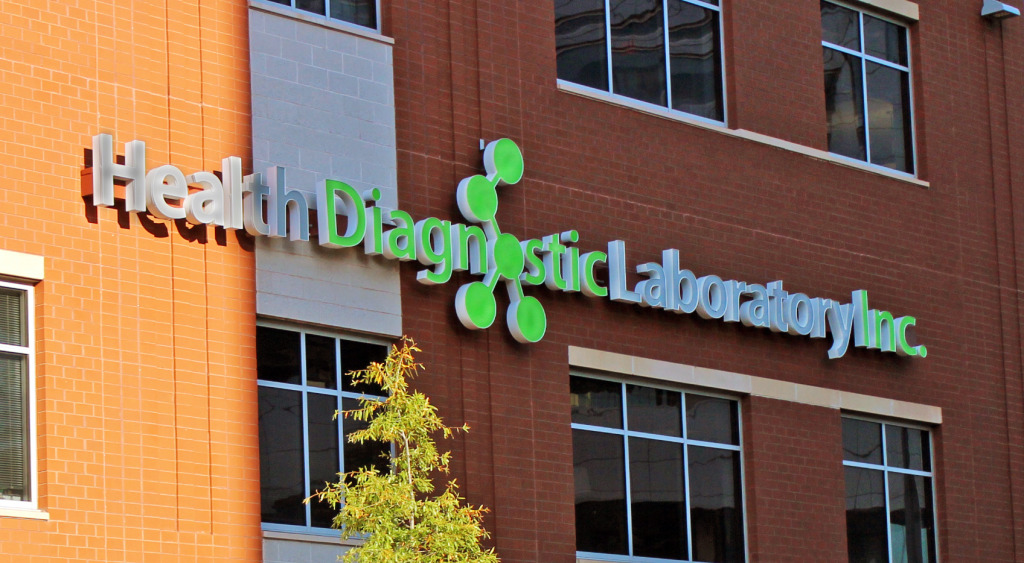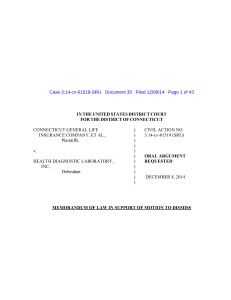A downtown medical lab firm is putting up a fight against a national insurance company.
Health Diagnostic Laboratory argued this week that an $84 million lawsuit filed against it in October by Connecticut-based Cigna should be tossed out.
Cigna’s case claims that HDL fraudulently billed the insurance firm at an inflated amount while waiving out-of-pocket fees for patients. Cigna’s case depends in part on provisions of the Employment Retirement Security Act of 1974, or ERISA, to make its arguments.
ERISA is a set of federal laws that protects retirement plan funds and includes regulations on how employer-based insurance policies are administered.
In its 43-page Dec. 8 response, HDL called for the case to be dismissed, alleging that Cigna’s claims are not properly founded in ERISA law.
“In reality, this suit is motivated by Cigna’s personal desire to limit out-of-network providers of healthcare services, such as HDL, that Cigna refused to allow to operate in-network,” the response states.
HDL alleges that Cigna’s suit falls flat when it makes the argument that HDL caused harm to any of the insurer’s plans. Under ERISA laws, Cigna must identify a way in which plan terms were violated, resulting in harm. HDL claims that the insurer fails to do so.
Cigna claimed that HDL engaged in a “fraudulent ‘fee forgiving’ scheme” that undermines the insurance system by unfairly promising free services to out-of-network patients. But HDL argues in its response that Cigna has failed to adequately explain how HDL’s actions constituted fraud.
HDL argues that Cigna does not point out the “who, what, when, where, and how,” necessary to plead fraud.
The $84 million lawsuit was filed shortly after a Wall Street Journal report questioned some of HDL’s business practices and the company’s founding CEO Tonya Mallory subsequently resigned.
A few weeks ago, HDL laid off 132 workers, and the company is cutting back on its charitable giving to local organizations. HDL remains one of several medical lab testing companies that are subject to a federal investigation over fees the firms paid to doctors to use their services.
HDL was founded in 2008 and makes its business on blood tests it claims can help doctors predict illnesses like heart disease. It is headquartered downtown in a new $100 million facility in the Virginia Biotechnology Park.
HDL is represented in the Cigna case by law firms LeClairRyan and Ropes & Gray.
A downtown medical lab firm is putting up a fight against a national insurance company.
Health Diagnostic Laboratory argued this week that an $84 million lawsuit filed against it in October by Connecticut-based Cigna should be tossed out.
Cigna’s case claims that HDL fraudulently billed the insurance firm at an inflated amount while waiving out-of-pocket fees for patients. Cigna’s case depends in part on provisions of the Employment Retirement Security Act of 1974, or ERISA, to make its arguments.
ERISA is a set of federal laws that protects retirement plan funds and includes regulations on how employer-based insurance policies are administered.
In its 43-page Dec. 8 response, HDL called for the case to be dismissed, alleging that Cigna’s claims are not properly founded in ERISA law.
“In reality, this suit is motivated by Cigna’s personal desire to limit out-of-network providers of healthcare services, such as HDL, that Cigna refused to allow to operate in-network,” the response states.
HDL alleges that Cigna’s suit falls flat when it makes the argument that HDL caused harm to any of the insurer’s plans. Under ERISA laws, Cigna must identify a way in which plan terms were violated, resulting in harm. HDL claims that the insurer fails to do so.
Cigna claimed that HDL engaged in a “fraudulent ‘fee forgiving’ scheme” that undermines the insurance system by unfairly promising free services to out-of-network patients. But HDL argues in its response that Cigna has failed to adequately explain how HDL’s actions constituted fraud.
HDL argues that Cigna does not point out the “who, what, when, where, and how,” necessary to plead fraud.
The $84 million lawsuit was filed shortly after a Wall Street Journal report questioned some of HDL’s business practices and the company’s founding CEO Tonya Mallory subsequently resigned.
A few weeks ago, HDL laid off 132 workers, and the company is cutting back on its charitable giving to local organizations. HDL remains one of several medical lab testing companies that are subject to a federal investigation over fees the firms paid to doctors to use their services.
HDL was founded in 2008 and makes its business on blood tests it claims can help doctors predict illnesses like heart disease. It is headquartered downtown in a new $100 million facility in the Virginia Biotechnology Park.
HDL is represented in the Cigna case by law firms LeClairRyan and Ropes & Gray.

